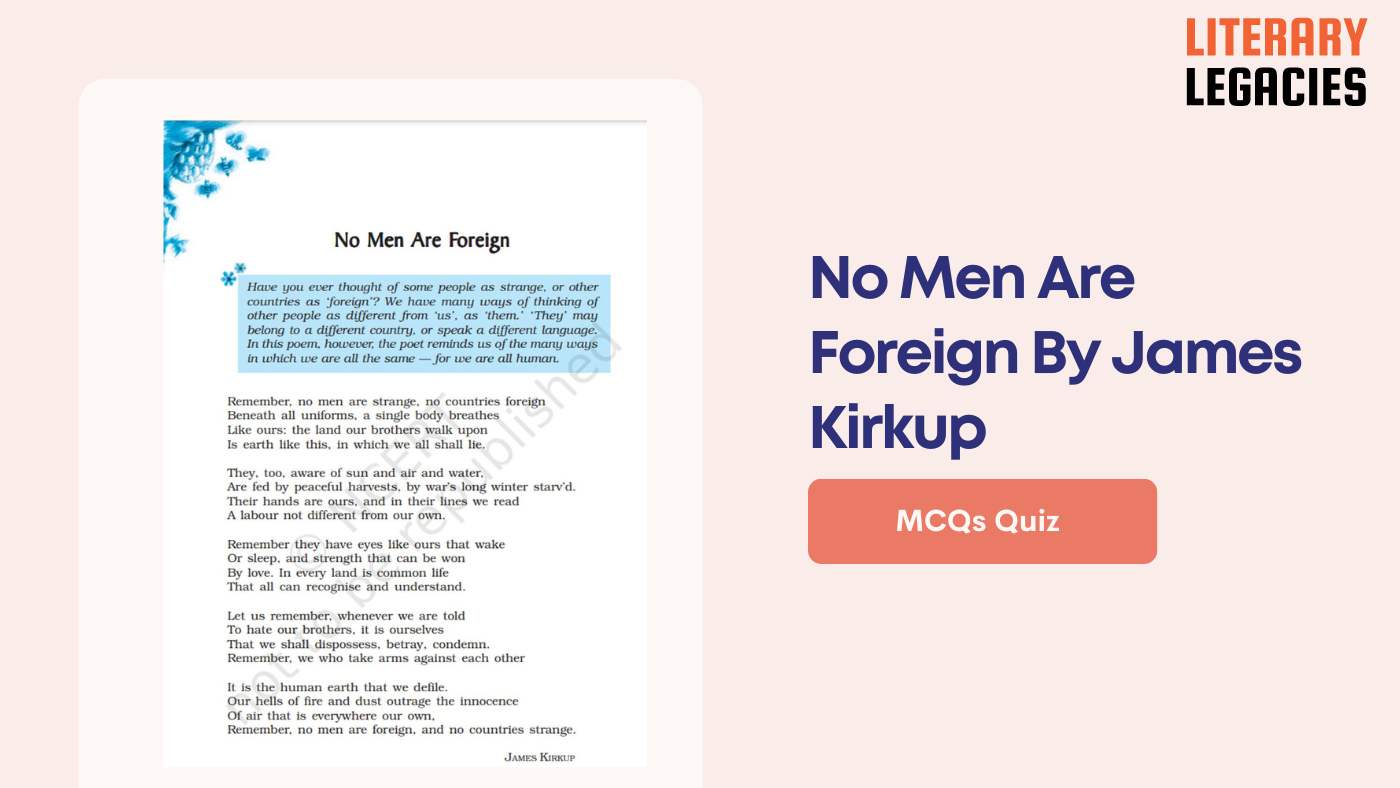1. What is the main idea the poet wants to convey to the readers?
A. That war is necessary for human progress
B. That people from other countries are different from us
C. That we should focus on our differences and borders
D. That people from other countries have the same bodies and share similar experiences
Answer: That people from other countries have the same bodies and share similar experiences (D)
The poet emphasizes the unity of humanity and the similarities that exist across countries and borders.
2. What does the poet mean by ‘under the uniform, we all have the same body’?
A. That people from different countries have different physical characteristics
B. That people from different countries have different skin colors
C. That people from different countries have similar bodies and organs
D. That people from different countries wear different uniforms
Answer: That people from different countries have similar bodies and organs (C)
The poet is highlighting the physical similarities that exist among all human beings, regardless of their nationalities.
3. What does the poet say is the same for people from all countries?
A. Their Sun, air, and water
B. Their languages and cultures
C. Their customs and traditions
D. Their food and festivals
Answer: Their Sun, air, and water (A)
The poet notes that people from all countries share the same natural resources, such as the Sun, air, and water.
4. What is the poet’s view on God’s treatment of people?
A. God favors people from certain countries
B. God differentiates between people based on their nationality
C. God is only concerned with people from one country
D. God treats everyone equally
Answer: God treats everyone equally (D)
The poet believes that God does not discriminate between people and treats everyone equally.
5. What is the common experience that people from all countries share, according to the poet?
A. Good days and bad days
B. Eating food and enjoying life during war
C. Eating food and enjoying life during peace
D. Suffering during war and good days
Answer: Good days and bad days (A)
The poet notes that people from all countries have experienced both good and bad days in their lives.
6. What is the poet’s message regarding the similarity between people?
A. That people from other countries have different goals and aspirations
B. That people from other countries are different from us
C. That people from other countries have different cultures and traditions
D. That people from other countries have similar bodies and experiences
Answer: That people from other countries have similar bodies and experiences (D)
The poet emphasizes the similarities that exist among all human beings, regardless of their nationalities.
7. What does the poet say about the strength of people from other countries?
A. That it can be won by war
B. That it can be won by love
C. That it can be won by power
D. That it can be won by hate
Answer: That it can be won by love (B)
The poet notes that the strength of people from other countries can be won by love, emphasizing the importance of compassion and kindness.
8. What is the poet’s view on the earth and human beings?
A. The earth is divided, and human beings are different
B. The earth is one, and human beings are the same
C. The earth is separate, and human beings are isolated
D. The earth is many, and human beings are diverse
Answer: The earth is one, and human beings are the same (B)
The poet believes that the earth is one and that human beings share a common humanity.
9. What is the central theme of the poem?
A. The differences between people from different countries
B. The role of war in human progress
C. The importance of national borders
D. The unity and similarity of human beings
Answer: The unity and similarity of human beings (D)
The central theme of the poem is the unity and similarity of human beings, regardless of their nationalities.
10. What is the poet’s wish regarding the borders of countries?
A. To remove the borders
B. To strengthen the borders
C. To maintain the status quo
D. To create new borders
Answer: To remove the borders (A)
The poet wishes to remove the borders of countries, emphasizing the importance of freedom and unity.
11. What is the underlying idea behind the title ‘No men are Foreign’?
A. Men from other countries are inferior
B. All men belong to the same human family
C. Nationality is a determining factor of human identity
D. Country borders are imaginary
Answer: All men belong to the same human family (B)
The title suggests that despite our geographical differences, we are all part of the same human family.
12. What is the poet’s perspective on the distribution of natural resources?
A. Natural resources are a gift from God
B. Nature is biased towards certain countries
C. Everyone receives natural resources in equal measure
D. Some countries have more natural resources than others
Answer: Everyone receives natural resources in equal measure (C)
The poet believes that everyone receives the bounties of nature, such as sunshine and land, in equal measure.
13. What is the tone of the poem?
A. Satirical
B. Melancholic
C. Aggressive
D. Peaceful
Answer: Peaceful (D)
The poem is often described as a peace poem, promoting a sense of unity and harmony among all people.
14. What is the significance of the phrase ‘they eat, live, die the same way’?
A. It emphasizes the differences between people
B. It emphasizes the universal human experiences
C. It suggests that people from different countries have different lifestyles
D. It highlights the importance of cultural diversity
Answer: It emphasizes the universal human experiences (B)
The phrase emphasizes that despite our cultural and geographical differences, we all share common human experiences.
15. What is the poet’s ultimate goal?
A. To establish a new world order
B. To promote the concept of universal brotherhood
C. To highlight the differences between nations
D. To create a sense of nationalism
Answer: To promote the concept of universal brotherhood (B)
The poet’s ultimate goal is to promote the concept of universal brotherhood, emphasizing the unity and equality of all people.
16. In which year was the poet’s first book of poetry published?
A. 1950
B. 1952
C. 1947
D. 1945
Answer: 1947 (C)
The poet’s first book of poetry was titled ‘The Drowned Sailor at the Downs’.
17. What is the approximate number of books written by the poet?
A. 30
B. 20
C. 50
D. 40
Answer: 30 (A)
The poet wrote a wide range of books, including autobiography, novels, and plays.
18. What type of poetry was the poet skilled in writing?
A. Ode and epic
B. Haiku and tanka
C. Ballad and limerick
D. Sonnet and free verse
Answer: Haiku and tanka (B)
The poet was known for his skill in writing haiku and tanka, two forms of Japanese poetry.
19. When did the poet pass away?
A. May 5, 2009
B. May 15, 2009
C. May 20, 2009
D. May 10, 2009
Answer: May 10, 2009 (D)
The poet died on May 10, 2009, at the age of 91.
20. Where was the poet born?
A. Australia
B. United States
C. United Kingdom
D. Canada
Answer: United Kingdom (C)
The poet was born on April 23, 1918, in the United Kingdom.
21. What is the main reason the poet asks us not to hate people from other countries?
A. Because we are all human beings with similar needs
B. Because they have the same style of uniforms
C. Because they may fight against our country
D. Because they are also responsible for dividing the earth into countries
Answer: Because we are all human beings with similar needs (A)
The poet emphasizes our shared humanity to promote global unity and understanding.
22. What is the poet’s message about the role of country and nationality?
A. It is a superficial division that separates us
B. It is necessary for global order and stability
C. It is the most important aspect of human identity
D. It determines our individual strengths and weaknesses
Answer: It is a superficial division that separates us (A)
The poet highlights the artificial nature of national boundaries to promote global unity.
23. What does the poet suggest we have in common with people from other countries?
A. Our uniforms and national identities
B. Our historical conflicts and rivalries
C. Our shared humanity and physical needs
D. Our cultural traditions and customs
Answer: Our shared humanity and physical needs (C)
The poet emphasizes our fundamental similarities as human beings.
24. What is the poet’s view on the significance of national borders?
A. They are a relic of the past and will soon disappear
B. They are essential for national security and identity
C. They are necessary for cultural diversity and exchange
D. They are artificial and separate us from our shared humanity
Answer: They are artificial and separate us from our shared humanity (D)
The poet sees national borders as divisive and artificial constructs.
25. What is the poet’s ultimate message about human beings?
A. We are fundamentally different and separate
B. We are connected and share a common humanity
C. We are inherently selfish and combative
D. We are primarily defined by our national identities
Answer: We are connected and share a common humanity (B)
The poet emphasizes our shared human experience and interconnectedness.
26. What unites people from all countries, according to the poet?
A. Their languages
B. Their cultural practices
C. Their food habits
D. Their spirit
Answer: Their spirit (D)
The poet believes that all people share a common spirit, regardless of their nationalities.
27. What do people from all countries experience during wartime, according to the poet?
A. Starvation
B. Peace
C. Abundance
D. Freedom
Answer: Starvation (A)
The poet notes that people from all countries suffer from starvation during long wars.
28. What is a common aspect of human life, according to the poet?
A. Their fascination with technology
B. Their love for nature
C. Their struggle to earn a livelihood
D. Their hatred towards foreigners
Answer: Their struggle to earn a livelihood (C)
The poet points out that people from all countries struggle to earn a livelihood.
29. What do people from all countries enjoy during peaceful times, according to the poet?
A. Famines
B. Starvation
C. Harvests
D. Wars
Answer: Harvests (C)
The poet notes that people from all countries enjoy the harvest during peaceful times.
30. What is a similarity between people from all countries, according to the poet?
A. Their height
B. Their destiny
C. Their skin color
D. Their language
Answer: Their destiny (B)
The poet believes that people from all countries share a similar destiny.
31. What is the consequence of hating people from other countries, according to the passage?
A. It will lead to self-destruction
B. It will not have any effect on us
C. It will unite people from different countries
D. It will bring prosperity to our country
Answer: It will lead to self-destruction (A)
Hatred towards people from other countries will have a negative impact on us and endanger human beings as a whole.
32. Why does the passage suggest that we should not kill people from other countries?
A. Because it will not benefit our country
B. Because it is against the law
C. Because it will deprive us of the bliss of universal brotherhood
D. Because it is not morally correct
Answer: Because it will deprive us of the bliss of universal brotherhood (C)



